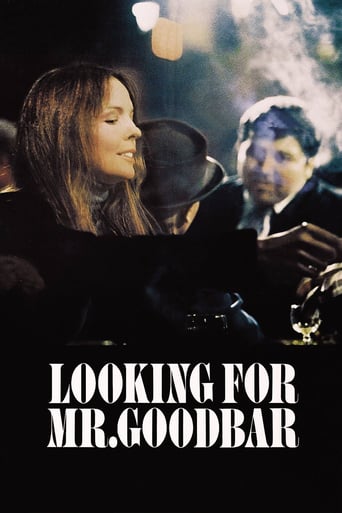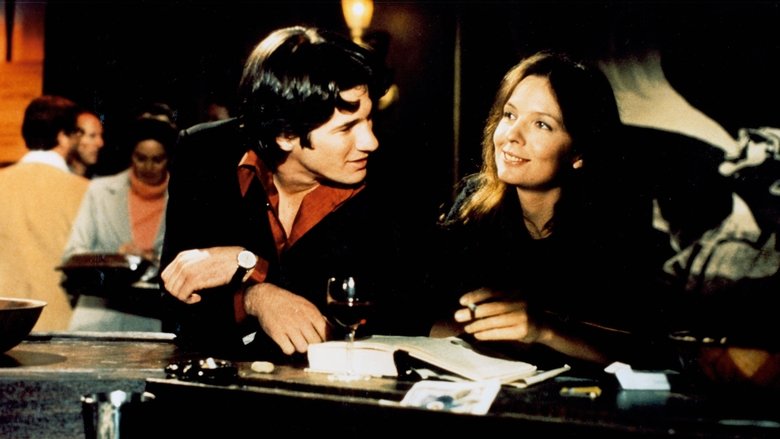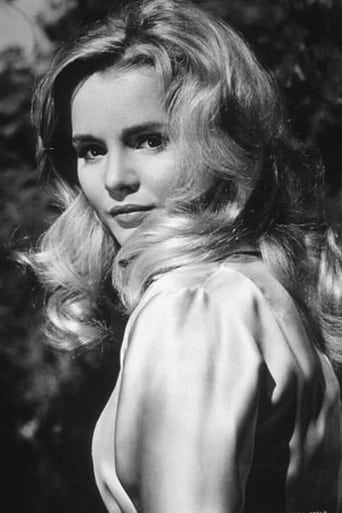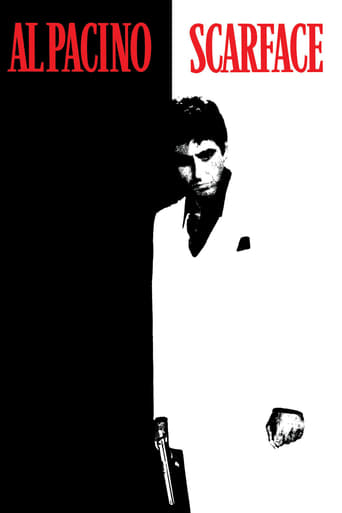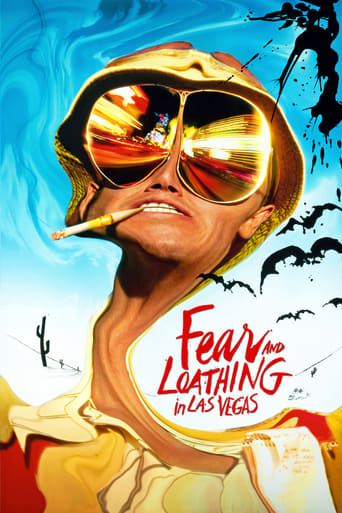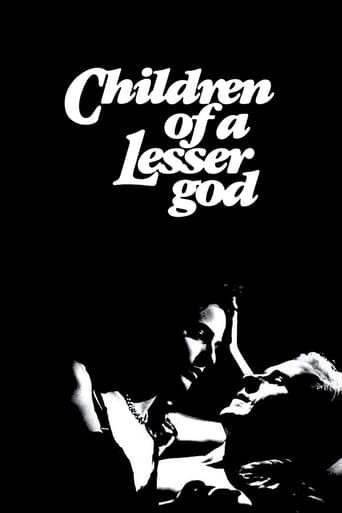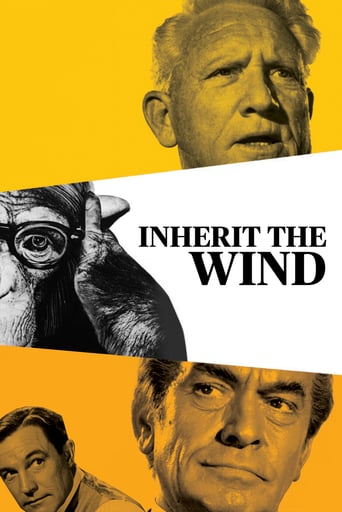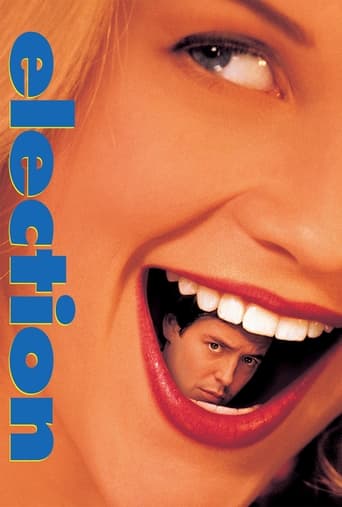Looking for Mr. Goodbar (1977)
A dedicated schoolteacher spends her nights cruising bars, looking for abusive men with whom she can engage in progressively more violent sexual encounters.
Watch Trailer
Free Trial Channels
Cast


Similar titles
Reviews
What makes it different from others?
Let me be very fair here, this is not the best movie in my opinion. But, this movie is fun, it has purpose and is very enjoyable to watch.
If you like to be scared, if you like to laugh, and if you like to learn a thing or two at the movies, this absolutely cannot be missed.
By the time the dramatic fireworks start popping off, each one feels earned.
Diane Keaton is excellent, playing the protagonist Theresa Dunn, a teacher who loves having casual sex and taking drugs. She hooks up with a variety of men, some of them dangerous.This film is based on a novel about a real-life NYC teacher, Roseann Quinn.
Saw this film on AMC last week and it still holds up. I first saw this film in 1977 as a college student living in a one room apt away from home for the first time, and it had a major impact on me. Diane Keaton made the move from the comedic heroine to the troubled Theresa Dunn, a sensitive, caring teacher by day, looking for love in all the wrong places at night. Her inner turmoil from her childhood disfiguring disease; to the relationship with her hard-nosed, Notre Dame loving, Irish Catholic father; to subsequent lovers is heartbreaking. Her search for the male attention and acceptance that she didn't receive at home is portrayed with honesty and depth by Keaton. Richard Kiley skillfully plays her father, who is of a different generation, where women knew "their place". He would rather turn and look the other way than face some hard family truths. It's evident that Teresa has a love/hate relationship with him when she refuses to accept the nice guy social worker, James, as a suitor mostly because her father admires him. She would rather engage in dead-end conquests than have a committed, romantic, relationship. Tuesday Weld was nominated for a Supporting Actress Academy Award for her role as Kathryn, Teresa's high-flying, stewardess sister; who can do no wrong in her father's eyes. Richard Gere's energy is electric and frightening during his scenes with Teresa. He has the raw male sexuality and danger Teresa finds exciting yet she is clearly his intellectual superior. Interesting stuff. Tom Berenger is great as the sociopathic loser, and look for a split-second role for Brian Dennehey as a doctor. This movie can serve as both a cautionary tale and a history lesson....the sexual revolution never seemed so scary.
Diane Keaton is a charming and attractive performer, but she is not up to this role. She is visibly uncomfortable in the sleaze/sex scenes and often resorts to mannerisms familiar from her Annie Hall character (watch this film and think of Annie Hall. It's obvious she is not immersed in the Theresa character). On the other hand, Keaton does well in the scenes where she is a teacher, and is quite convincing. Despite the all-around histrionics, she is not bad in the family scenes with sister and father. But this film fails for a few reasons. It has a dark, depressive atmosphere that is not justified by its outcome: poor Theresa is damaged emotionally by her physical 'defects' and by a too-strict Catholic upbringing, this is believable. And it's believable that a person lacking self-confidence would seek out acceptance and affirmation from promiscuous sex (a fairly common scenario, actually). But the film really does seem to say that Theresa deserves her fate in the end. She blows off the one man (Atherton) who would have made sense as a partner and feels compelled to continue a descent into debauchery. Doesn't this film seem to say, keep up with this kind of lifestyle and you'll end up miserable and bitter (like Theresa's sister ) or brutally murdered? This film seems to indulge us in its sleazy world, yet it seems to judge Theresa for immersing herself in it in a vain attempt to ease her pain. Note the way director Richard Brooks chooses to end the film, on Theresa's face as the life blinks out of her--there is no requiem, no final coda expressing pity or remorse. We have been shown the brutal murder of a sympathetic character as if it were a scene from a cheap horror movie. Diane Keaton is not solely to blame for the ultimate failure of the film, the writers and director are more responsible. Still, it's hard not to imagine Keaton and Tuesday Weld exchanging roles: Weld has a much wider range as an actress and certainly would have handled the 'secret life' with more conviction.
Directed by Richard Brooks, "Looking for Mr Goodbar" stars Diane Keaton as Theresa Dunn, a school teacher who seems prim and proper by day, but has clandestine sexual encounters with men by night. Brooks offers a number of trite explanations for Theresa's obsession with sex, but only one is interesting; as she suffered from Polio as a kid, Theresa believes that she is unable to give birth to a healthy child. Denied motherhood, she thus embarks on a kind of hedonistic night-life. When it was released 1977, many viewed "Looking for Mr Goodbar" as a supremely reactionary film. This is a flick about sexually liberated women who turn their backs to Catholic and conservative values, have lots of sex and are then beaten and stabbed to death by men. Gay men, meanwhile, are portrayed as sexually confused brutes who stab women as a means of assuaging their impotency around women. The supposed message: don't sleep around and stay away from crazy gays!Indeed, upon release, a number of Catholic priests praised "Looking For Mr Goodbar" and took out newspaper spreads promoting the film. To believers, "Goodbar" was touted as a "stern warning!" Brooks himself structures the film as a descent into hell, Theresa's basement apartment becoming increasingly dark and dingy as the film progresses. The film then ends with Theresa being killed in the shadows, Brooks focusing on a creepy freeze-frame of her darkness shrouded dead face. It's like an image out of "The Exorcist".But whilst "Goodbar" may be reactionary in some regards, Brooks also complicates things. His male characters are uniformly violent/disgusting and several sequences seem designed to bash conservative America (see Brooks' masterpiece, "Elmer Gantry"). The film seems less like a condemnation of the sexual revolution, than a nihilistic repudiation of everything, including sex; any of the men Theresa encounters could be killers.Elsewhere the film undermines anyone who might embody a traditional normality. University professors cheat on their wives and exploit female students, Theresa's own family unit is fractured, sustained by repressive illusion, and her father is a brute. Meanwhile, the men Theresa sleeps with dance with phallic switchblades or are ignorant of her needs. The film's gay murderer is himself not "crazy because he is gay", but because social forces won't allow him to be gay (he juggles a wife and an offensively portrayed, stereotypical gay lover). Theresa also echoes the gay character in complex ways. She is excluded from a normal life because of a hereditary disease, and is the victim of a society that assigns people fixed roles, imposing on them notions of what a "real man" or "real woman" should be. For Brooks, normality seems like a ideological construct, and violence arises more out of a cultural situation than individual responsibility. Complicating things further, the film's "love scenes" are shot to emphasise Theresa's pleasure and the bars she frequents are positively portrayed, and not hive's of debauchery.Regardless of the film's message, "Looking for Mr Goodbar" is a dull, repetitive film. It features a number of jarring flashback/fantasy sequences, is sensationalistic, flaunts its grime, is overly proud of its sleazier elements and wastes a strong performance by Diane Keaton.6/10 - Worth one viewing.

